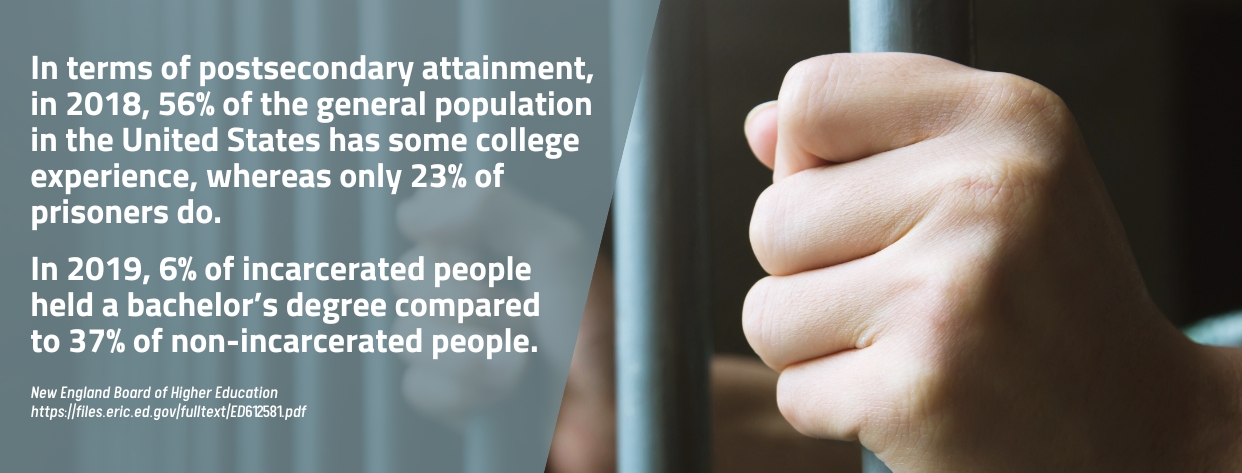Find Your Perfect School
You’ve recently gotten out of jail, and now you’re thinking of building a new life for the better. Your next move is to pursue a college degree that leads to better job opportunities. Would your criminal record prevent you from being admitted?
Additional Information: Best Degrees for Convicted Felons
While there’s no law banning applicants with a criminal history from submitting college applications, several schools are now doing criminal background checks, making it harder for these students to start a new life. Yet, many schools assess this case-by-case; they don’t formally impose limits like barring entry to those with felonies. So, while it’s more challenging to pursue a trade school or a college with a felony record, it’s not impossible!
Challenges Felons Face in Entering College
Some may believe that after an offender has been found guilty, sentenced to prison, undergone theoretical rehabilitation, and been freed, they are now free to reintegrate into society. The truth is that it is extremely difficult for those who have spent their time in prison to rejoin society and contribute.
A recent US Department of Justice study revealed that, on average, a felony conviction results in as little as three years in prison. This imposes that most offenders still have most of their lives ahead of them. However, another Department of Justice study indicated that 76% of the thousands of released criminals investigated were jailed again within five years of their release, demonstrating the detrimental impacts of the failure to reintegrate ex-offenders into society. What difficulties do prisoners encounter when attempting to reintegrate into society?
Housing Options
Ex-offenders are largely excluded from the private housing market due to the stigma of being an ex-felon, making finding safe and affordable housing almost impossible. Public housing for low-income people is frequently their only option, where the prevalence of narcotics, gang violence, and other criminogenic elements is common in these housing developments.
According to studies, a shortage of housing options feeds a vicious cycle of rising homelessness and incarceration.
Employment
Finding and retaining employment and appropriate housing can significantly increase ex-offenders chances of rejoining society. However, the stigma associated with being an ex-convict drastically restricts the number of sustainable work options open to them.
Job positions dealing with customers daily, such as retail, frequently are among the least inclined to contemplate hiring a criminal. Employer resistance is more pronounced when the incident involved is violent and less pronounced when it involves a nonviolent drug charge.
Many former inmates can only find unstable, low-paying work in industries like manufacturing or construction. This makes it highly challenging for them to sustain themselves and their family. Ex-offenders are frequently required to pay additional fines, such as fees for parole supervision, court charges, restitution, child support, drug testing, counseling, and more.
Finding employment possibilities can be difficult because many offenders have a minimal work history, which only confuses matters further. At the time of their arrest, more than one-third of all convicts were unemployed, according to the Bureau of Justice Statistics.
Limited Educational and Financial Aid Options
In the US, 39 and 40 million people lack a high school diploma or GED. It is clear why the Department of Education identifies current and former offenders as one of the most educationally disadvantaged groups in America when you consider that 68% of those who were convicted of a crime did not have a high school certificate or GED.
While some jails provide educational programs, the need to cut costs and the emergence of for-profit private prisons have significantly curtailed their number and accessibility.
Another reason most felons no longer consider pursuing higher education is the lack of Federal financial aid. Federal financial aid is not available to offenders convicted of forcible or non-forcible sexual offenses. However, you are not barred from applying for federal student aid if you have convictions for drug possession, assault, or theft.
Voter Disenfranchisement
Voting is crucial to being a socially involved citizen in any democracy. However, 35 states forbid parolees from voting, and another 12 states have laws that either permanently restrict people with felony records from voting or require lengthy waiting periods before they can vote again.
This implies that countless people in a nation hailed as a model of contemporary democracy can still not cast a ballot even after serving their entire prison sentence, receiving their release, or finishing their probationary period.
While reform organizations like FairVote and the American Civil Liberties Union (ACLU) are working hard to modify these rules, state governments, who have historically been reluctant to confront such a contentious issue, hold the capacity to do so.
More Info: The Best Online Accredited Trade Schools
Tips for Felons Entering College
#1: Earn a GED
Several convicted felons do not possess a high school diploma or GED.
Nowadays, a GED is very important. Even minimum wage, entry-level jobs require applicants to hold a high school diploma or equivalent. It’s not too late to take the GED if you have a felony and cannot complete it while serving your sentence.
Fortunately, those who want to obtain their GED have numerous options available. Some are even available online at no cost. This means that getting an education without allowing your past to prevent you from succeeding has never been simpler or more affordable!
However, after serving your time for several months or years, you may have retained little knowledge from school. We’re here to remind you that passing the GED takes work. It takes time and a lot of studying. It takes at least three months to study and pass at the current difficulty level.
An excellent way to increase your chances of obtaining a GED is to take as many practice tests as possible. The more questions you are able to answer, the better your test-taking abilities, knowledge base, and focus can become.
You can use GED Exam Prep Book, Free Adult Education Classes, or enroll in Community College GED Prep and Online GED Classes.
#2: Know What Financial Aid Options are Available
Criminal convictions significantly affect students who want to pursue a college education. Criminal records are one of the reasons why students are denied financial and/or federal aid. But before panicking, remember that not every criminal case has the same consequences when applying for financial opportunities.
You can be qualified for FAFSA if you’re on probation or parole. Yet, the eligibility will vary depending on your offense. A drug-related or sexual offense will probably impact your eligibility.
You may or may not be eligible for financial help if you submit a FAFSA and have a criminal drug conviction on your record. If you’ve been convicted of a drug offense while receiving financial aid, you will be asked to disclose it on the FAFSA application. After that, FAFSA will ask you to complete a questionnaire to assess your overall eligibility.
You can regain eligibility by finishing a drug rehabilitation program or passing two random drug tests conducted by a drug rehab program. If your eligibility does return, you should inform your financial aid immediately.
However, if you attend a federal or state-run college, you won’t be qualified for a Federal Pell Grant or federal student loans. The chances of you receiving a Federal Supplemental Educational Opportunity Grant (FSEOG) are slim.
Your eligibility will change if you’re not enrolled in a federal or state university. Federal Pell Grants and FSEOGs will be available to you, but federal student loans will not be available to you. Although you qualify for an FSEOG, your chances of receiving one are still slim.
#3: Enroll in a Community College
Considering that prominent universities have more rigorous admissions processes and higher tuition costs, it’s often best for applicants with criminal histories to start at community colleges. Community colleges have easier application processes and cheaper tuition fees. Additionally, many of the same educational resources and opportunities are available at community colleges at large universities, and they provide various degree courses.
According to the College Board, tuition has dramatically increased in recent years, rising 11% over the last five years to an average yearly cost of $39,400 for private colleges and $10,940 for public colleges in-state. These numbers may feel overwhelming as a felon with restricted financial aid opportunities and limited job options.
Contrarily, community college is far less expensive, especially if you attend a nearby institution. A 2-year degree can be obtained for less than the price of a single year at an average 4-year university. The average tuition of 2-year colleges is $10,300.
Additionally, obtaining an associate’s degree can increase your chances of acceptance into four-year colleges and universities. Not only will you be able to transfer some credits, but admissions officers will also see your dedication to starting a new life.
#4: Emphasize the Lessons Learned from the Crime Committed
Imagine not having a place to call your own, having no control over whom you spend time with, what you eat, or where you go, day in and day out, year after year. Threats and mistrust are present everywhere. Finding love or even a kind human touch can be challenging. You are cut off from your loved ones and friends.
Prisoners are kept in this setting, giving them no choice but to adapt if they want to survive. But this is not simply stating, “I’ve learned my lesson, and I’m not gonna commit it again.” You have to be more inspiring for the admissions officer.
Many felons have expressed how their situation in prison led them to reflect on their lives in general. Others see imprisonment as something that saved them from more serious crimes. Others talk about how prison helped them develop common sense, better judgment, insight, and intellect.
Talk about how badly you want to attend college for a brighter tomorrow.
In many ways, life outside of prison is similar. To make wise choices, we must rely on ourselves. Making incorrect decisions can ruin our best relationships, end a lucrative business deal, bankrupt us, and make our lives miserable.
#5: Point Out the Productive Things Achieved while Incarcerated
Your world briefly stops once the judge reads your punishment and finds you guilty. You start to dread being in prison. But jail life is not the end of your life, so do the redemption in style.
Talk about your daily life in prison, what you did to make your day productive, or what hobbies you developed and skills you learned. Also, emphasize how those activities will help you while attending college.
#6: Provide Letters of Recommendation/Reference from Parole and Probation Officers to Attest to your Character
Colleges and universities won’t give you the benefit of the doubt if you have a criminal record and are applying for degrees. No matter what you were convicted of, you will frequently be considered dishonest and unreliable. It is quite challenging to go past that bias.
Admissions officers can learn more about the strongest facets of their experience and abilities through letters of recommendation from parole and probation officers. You can also ask LORs from respected community members, such as religious leaders or your former teacher/employer. The authors of these letters will extol your virtues and basically state that you’re ready for a new and better life. This is incredibly valuable!
#7: State the Responsibilities that were Assigned to you During Incarceration
Several prison agencies want every non-disabled prisoner to have employment. Prisoners can apply for positions that will better prepare them for employment after their release.
While most states do not pay inmates, others pay them a very meager wage for their labor. Inmates who labor in prison gain work experience and strengthen their work ethic. Inmates can learn skills in a variety of occupations.
Regardless of your assigned duty/responsibility, discussing and explaining how it impacted your skills will give you a better edge for admission.
#8: Practice the “Don’t Ask, Don’t Tell” Policy
While some colleges and universities require students to disclose their criminal history, some do not. Refrain from asking if you need to submit a background check. You’ll be surprised that many schools, especially online schools, no longer require students to disclose their criminal histories.
#9: Accept That You May No Longer Have The Same Opportunities as Non-Convicted Students
This is not to say that you’re less of a human being if you’ve committed a crime — well, not unless it involves taking the lives of others — but this is to remain grounded to the fact that you’ll be stigmatized and experience more difficulty in obtaining opportunities in general. Not only will you be having difficulties in gaining admission to colleges and receiving financial aid, but you’ll also have no less to no chance of on-campus housing.
Because you’ll have limited job opportunities, pursuing a degree that leads to career paths with less discrimination in ex-felons is best. Two of the best degrees you can pursue as a former convicted student include a substance abuse counseling degree and a computer science degree. You can also pursue degrees that allow you to create your own business and pursue self-employment.
#10: Find a Support Network
The college application process is complicated enough for a student without any criminal offense, let alone for someone who served jail time. While the process is difficult, you don’t have to go through it alone.
By lessening the burden of adjusting to daily life and assisting ex-felons in pursuing new paths, nonprofits, prison facilities, and legal aid organizations are attempting to minimize that high recidivism rate.
Reintegration programs are available in many states, counties, and cities, and they might be an excellent place for people with criminal records to start.
Popularly known organizations known for helping former prisoners redirect their lives include:
Take a look: The Highest Paying Jobs With A Trade School Education



